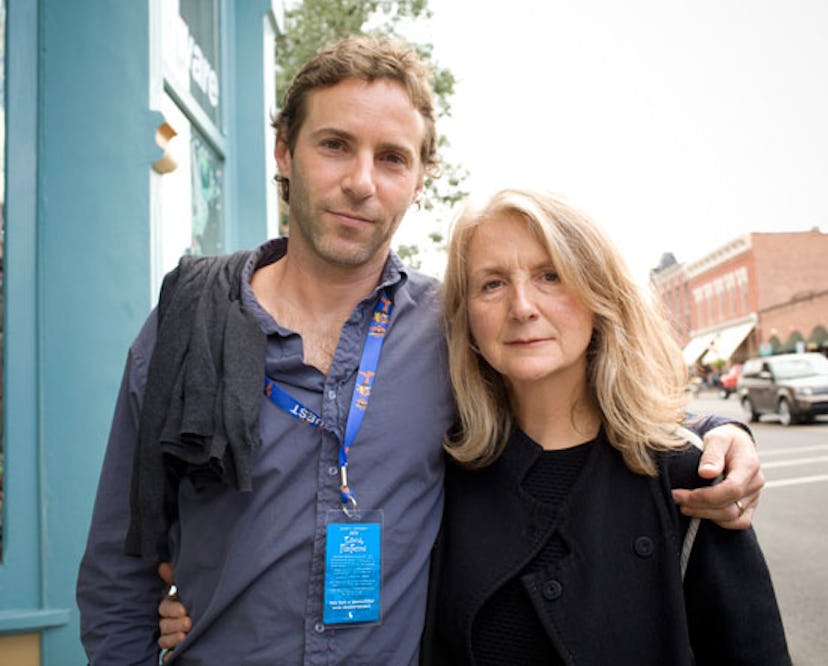FIVE MINUTES WITH ALESSANDRO NIVOLA
“Part of the point of acting is being able to commit every kind of indiscretion imaginable and have no consequences,” says Alessandro Nivola, the actor (Junebug, Mansfield Park, Coco Before Chanel) who plays the antihero...

“Part of the point of acting is being able to commit every kind of indiscretion imaginable and have no consequences,” says Alessandro Nivola, the actor (Junebug, Mansfield Park, Coco Before Chanel) who plays the antihero in writer-director Sally Potter’s Ginger and Rosa. “Not to say that I’m eyeing up 16-year-old girls in the street,” he continues, “but it’s fun to break the rules.”
The film, which screens at the Toronto International Film Festival today ahead of its October 19th release, is a coming of age story with a complicated dynamic. Ginger (Elle Fanning) and Rosa (Alice Englert) play best friends whose relationship is tested by the social and sexual revolution of the 1960s. As Ginger protests the nuclear bomb, Rosa begins an affair with Roland (Alessandro Nivola), a charismatic pacifist who also happens to be Ginger’s father. The subsequent exploration of love and freedom—thematically similar to An Education—results in a multitude of deft performances seemingly created to showcase the actors’ chops.
W caught up with Nivola after the film premiered at the Telluride Film Festival—“the best cult in the world,” he says—last weekend.
You’re a family man—you have two small children and you’re married to Emily Mortimer—so you’re very different than Roland. How did you avoid turning him into a villain? If he were too easy to dismiss, it would diminish the power of the story. What I love about the character is that [writer-director Sally Potter] puts words of truth in the mouth of an untrustworthy character. You can’t get away from the fact that everything he says is true, but you’re also watching him seduce somebody he probably shouldn’t.
The plot sits in that word “probably.” Those kinds of relationships are difficult to know how to respond to morally. Your first reaction will always be that there’s something deeply wrong about it—the power dynamic is upsettingly skewed to the older person in the relationship. But then I keep coming back to Woody Allen, and that’s about as taboo of a romance as you could find. I got to know them a little bit when Emily was filming Match Point, and they seem like an incredibly happy, well-adjusted couple.
How does the dynamic change on the set when you’re working with younger, less experienced actresses? Then again, I suppose Elle has been acting her whole life… … and past lives! Elle was 13 when we were filming, and Alice was 17, and they were both playing 16. It was very different working with each of them—they’re at different stages of their lives and their development, as far as romantic experiences. Elle is just a natural. Everything she does just seems to come without any particular method or theory behind it. It’s just there. In some ways Alice had a trickier row to hoe in that there were technical turns that demand a certain kind of technique. As with my own children, I tried to talk to them as contemporaries. I don’t mean in the sense of destroying their innocence, but it would have been absurd to condescend to the girls, given how precocious they both are.
I heard you had to do some of your close ups staring at an “X” on the wall. Why? The first week, because of child labor laws, Elle had to go next door every 20 minutes or so and have a geography lesson. As is generally the case with any movie, we got behind. They started asking me if it would be all right if I would do my close-ups without her. There were times where I drew a little “X” on the wall—a few scenes where I’m not talking to her in my close ups.
That had to be frustrating. When they first asked me to do that, I was kind of horrified. I had these images in my head of certain older, irascible actors who do their side of their coverage and just walk off back to their trailer and leave their co-stars to do the other side on their own. And while obviously that’s not what Elle was doing, I had a moment where I thought, “Am I being forced to sacrifice my performance?” But then, as we experimented with it, everybody seemed really happy. Filming is such a mysterious thing.
A lot of people seem to think that you’re English. I’ve often gone to start a film only to find the producers surprised to discover that I’m American.
How did this happen to a nice boy from Boston? By no design of mine! I got a script in the mail from Michael Winterbottom for a little movie called I Want You. I was to star opposite Rachel Weisz and play a fisherman from Hastings, which is this small, coastal town on the south coast of England. I’d been to England only once at this point. [The part] opened up a new world—Mansfield Park, Love Labour’s Lost—and I was there for three years. To this day, I have no goddamn idea why Michael had it in mind that I was the person for the job.
Photos: Nivola: © PamelaGentile; Ginger and Rosa: © Nicola Dove/Adventure Pictures